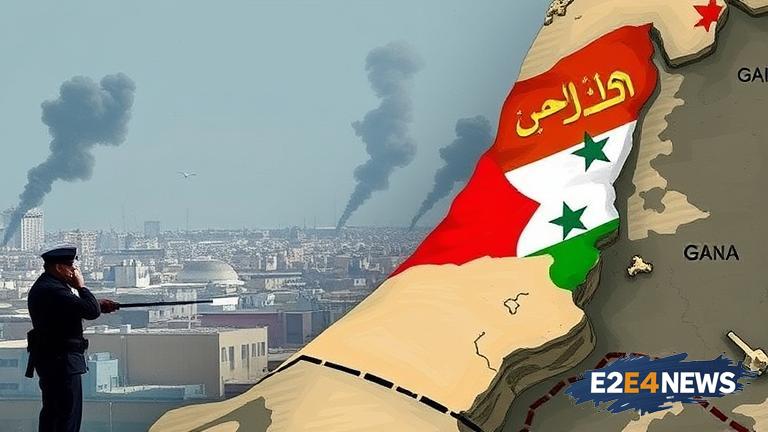The Israeli government, led by Prime Minister Benjamin Netanyahu, has been making headlines with its alleged plans to take control of the entire Gaza Strip. This move has raised eyebrows among the international community, with many expressing concerns about the potential consequences of such an action. The Gaza Strip, a coastal region bordering Egypt and Israel, has been a point of contention between Israel and Palestine for decades. Netanyahu’s reported plan to control the area has sparked fears of increased tensions and potential human rights violations. The Israeli government has been facing criticism for its handling of the Palestinian-Israeli conflict, with many accusing it of perpetuating a policy of occupation and segregation. The Gaza Strip has been under Israeli blockade since 2007, which has led to a severe humanitarian crisis, with high levels of poverty, unemployment, and food insecurity. The United Nations has repeatedly called for an end to the blockade, citing the devastating impact it has on the civilian population. Netanyahu’s plan to control the Gaza Strip has been met with skepticism by many, who question the feasibility and legality of such a move. The international community has long recognized the Gaza Strip as an integral part of the Palestinian territories, and any attempt to annex or control it would be seen as a violation of international law. The Palestinian Authority has condemned Netanyahu’s reported plan, stating that it would undermine the prospects for a two-state solution and perpetuate the cycle of violence. The Israeli government has been accused of using the Gaza Strip as a bargaining chip in its negotiations with the Palestinian Authority, with many seeing the reported plan as a ploy to exert pressure on the Palestinians. The humanitarian situation in the Gaza Strip is already dire, with many residents struggling to access basic necessities like food, water, and healthcare. The United Nations has warned of a potential catastrophe if the situation is not addressed, with the risk of a complete collapse of the Gaza Strip’s infrastructure and economy. The international community has a responsibility to act and prevent such a scenario from unfolding. The European Union, the United States, and other major powers have been urged to take a strong stance against Netanyahu’s reported plan and to work towards a peaceful resolution to the conflict. The Israeli government must be held accountable for its actions, and the international community must ensure that the rights of the Palestinian people are protected. The situation in the Gaza Strip is a complex and sensitive issue, requiring a nuanced and multifaceted approach. A lasting solution can only be achieved through a negotiated settlement that takes into account the needs and concerns of both Israelis and Palestinians. The reported plan to control the Gaza Strip is a step in the wrong direction, and it is imperative that the international community acts to prevent it from becoming a reality. The consequences of inaction would be catastrophic, with the potential for widespread human suffering and instability in the region. The world cannot afford to stand idly by while the Gaza Strip teeters on the brink of disaster. It is time for the international community to take a stand and demand that the Israeli government respects the rights and dignity of the Palestinian people. The fate of the Gaza Strip and its residents hangs in the balance, and it is imperative that the world acts to prevent a humanitarian catastrophe. The Israeli government must be held to account for its actions, and the international community must work towards a peaceful and just resolution to the conflict. The reported plan to control the Gaza Strip is a wake-up call for the international community, and it is time to take action to prevent a disaster from unfolding. The Gaza Strip is a symbol of the Palestinian people’s struggle for freedom and self-determination, and it is imperative that their rights are respected and protected. The world must act to prevent the Gaza Strip from becoming a permanent fixture of the Israeli-Palestinian conflict, and to ensure that the residents of the area are able to live in peace and dignity.
